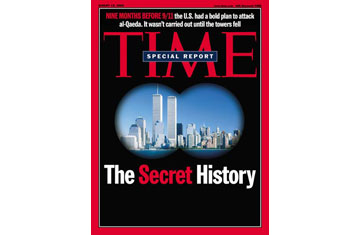
(13 of 19)
Predictably, nerves frayed. Clarke, who was widely loathed in the CIA, where he was accused of self-aggrandizement, began to lose credibility. He cried wolf, said his detractors; he had been in the job too long. "The guy was reading way too many fiction novels," says a counterterrorism official. "He turned into a Chicken Little. The sky was always falling for Dick Clarke. We had our strings jerked by him so many times, he was simply not taken seriously." Clarke wasn't the only one living on the edge. So, say senior officials, was Tenet. Every few days, the CIA director would call Tom Pickard, who had become acting director of the FBI in June, asking "What do you hear? Do you have anything?" Pickard never had to ask what the topic was.
In mid-July, Tenet sat down for a special meeting with Rice and aides. "George briefed Condi that there was going to be a major attack," says an official; another, who was present at the meeting, says Tenet broke out a huge wall chart ("They always have wall charts") with dozens of threats. Tenet couldn't rule out a domestic attack but thought it more likely that al-Qaeda would strike overseas. One date already worrying the Secret Service was July 20, when Bush would arrive in Genoa for the G-8 summit; Tenet had intelligence that al-Qaeda was planning to attack Bush there. The Italians, who had heard the same report (the way European intelligence sources tell it, everyone but the President's dog "knew" an attack was coming) put frogmen in the harbor, closed airspace around the town and ringed it with antiaircraft guns.
But nothing happened. After Genoa, says a senior intelligence official, there was a collective sigh of relief: "A lot of folks started letting their guard down." After the final deputies' meeting on Clarke's draft of a presidential directive, on July 16, it wasn't easy to find a date for the Principals' Committee to look at the plan--the last stage before the paper went to Bush. "There was one meeting scheduled for August," says a senior official, "but too many principals were out of town." Eventually a date was picked: the principals would look at the draft on Sept. 4. That was about nine months after Clarke first put his plan on paper.
A BURNED-OUT CASE
Clarke wasn't the only person having a bad year. In New York City, John O'Neill led the FBI's National Security Division, commanding more than 100 experienced agents. By spring they were all overloaded. O'Neill's boss, Assistant FBI Director Barry Mawn, spent part of his time pleading with Washington for more agents, more linguists, more clerical help. He got nowhere. O'Neill was a legend both in New York, where he hung out at famous watering holes like Elaine's, and in the counterterrorism world. Since 1995, when he helped coordinate the arrest in Pakistan of Ramzi Yousef, the man responsible for the 1993 bombing of the World Trade Center, O'Neill had been one of the FBI's leading figures in the fight against terrorism. Brash, slick and ambitious, he had spent the late 1990s working closely with Clarke and the handful of other top officials for whom bin Laden had become an obsession.
